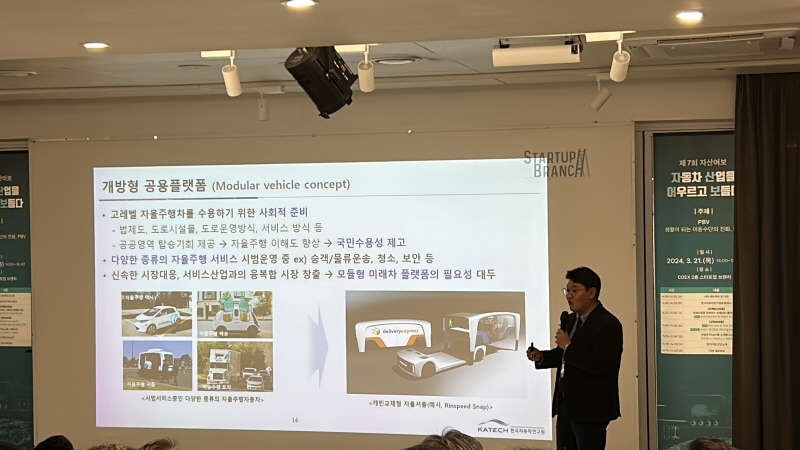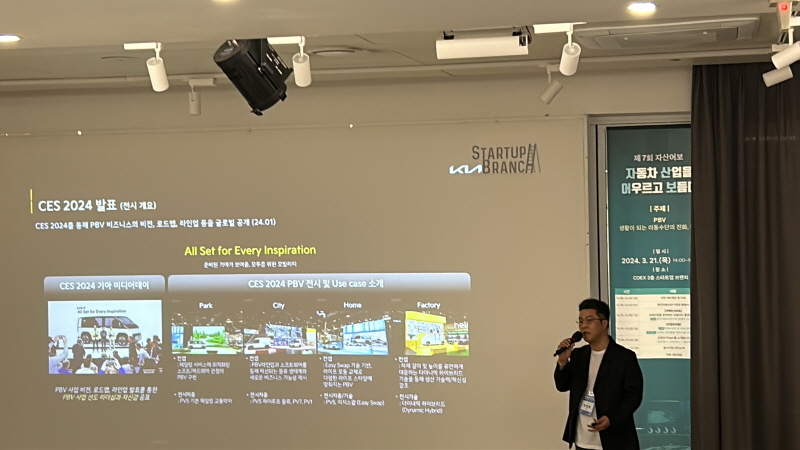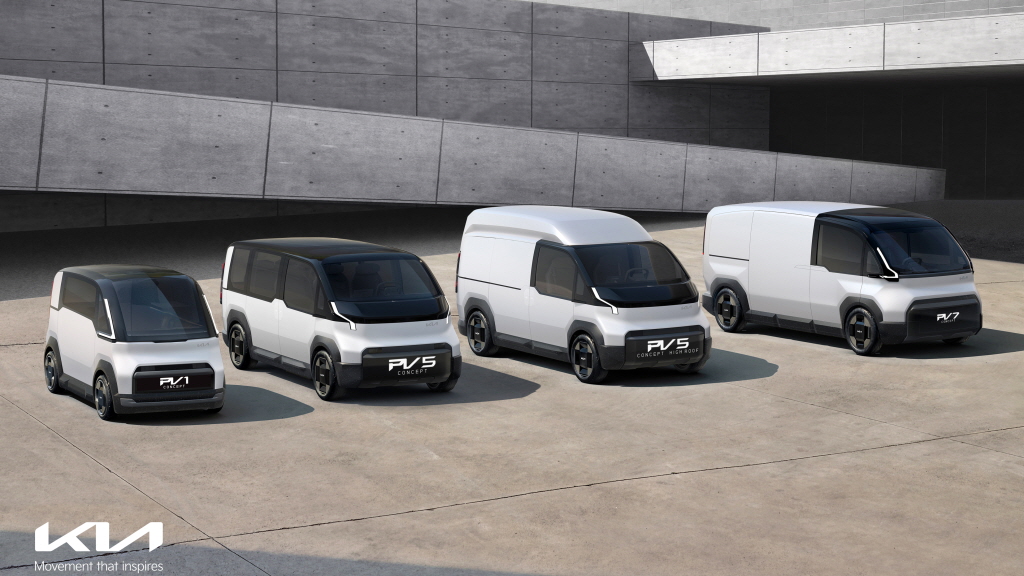전기차, 자율주행, 카셰어링 세 가지가 선순환하며 자동차 산업계를 발전시킬 것이라는 전문가의 분석에 이어 피플 무버, 물류 등의 역할을 자유롭게 넘나들 수 있는 기아의 PBV 전략과 2025년 7월 PBV 첫 모델 양산에 들어간다는 계획이 발표됐다.
“전기차·자율주행·카셰어링이 선순환하며 車 산업 발전시킬 것”
기아 PBV 전용 생산 공장 95% 완성…내년 첫 PBV 모델 양산
자동차 산업계의 대격변이 코앞으로 다가왔다.
전기차, 자율주행, 카셰어링 세 가지가 선순환하며 자동차 산업계를 발전시킬 것이라는 전문가의 분석에 이어 피플 무버, 물류 등의 역할을 자유롭게 넘나들 수 있는 기아의 PBV 전략과 2025년 7월 PBV 첫 모델 양산에 들어간다는 계획이 발표됐다.
한국자동차연구원(이하 한자연)은 21일 코엑스 스타트업 브랜치에서 목적 기반 자동차(Purpose Built Vehicle, 이하 PBV)의 현황과 전망 및 발전 전략에 대하여, 유관기관·기업 간 다채롭게 소통할 수 있는 교류의 장을 마련했다.
이번 제7회 행사에서는 미래 스마트 모빌리티 솔루션으로 주목받고 있는 ‘PBV’의 현황과 전망 및 발전 전략에 대해서 폭넓게 다뤄졌다.
문철우 한자연 플랫폼안전기술부문 연구실장은 ‘미래산업을 준비하는 모빌리티 플랫폼 기술’을 주제로 발표하며 “자동차 산업계는 전기차, 자율주행, 카셰어링 세 가지가 선순환하며 발전하게 될 것이라 믿는다”며 전”기차를 통한 자율주행, 주행거리 이슈는 공유형 플랫폼을 통해서 개선이 가능할 것으로 전망된다”고 전했다.

▲문철우 한자연 플랫폼안전기술부문 연구실장
문 연구실장은 산업 생태계의 변화에도 주목했다.
전통적인 티어 1, 2, 3의 관계에서 IT 업계와 같이 기존에 자동차 산업에서 활동하지 않던 플레이어들이 새롭게 들어오면서 상하 수식 관계가 아닌 병렬 관계로서 서로의 영향력을 행사하는 형태로 산업계가 변화하고 있다.
Bosch와 같은 대표적인 부품 기업에서 완성 형태의 차를 내놓고 있는 것이 대표적인 예다.
문 연구실장은 “부품 기업들이 자율주행, 카셰어링 등 서비스, IT 융합 키워드 아래에서 완성차 영역을 넘보고 있고, IT 영역으로 넘어가서 서비스 영역으로 산업 전환을 하려는 거 아닌가라는 생각도 해 볼 수 있다”며 “다양한 시각으로 현재 자동차 산업계를 바라볼 필요가 있다”고 강조했다.
CES 2024에서 PBV로 인상적인 모습을 남겼던 기아도 이날 행사에 참여했다.
기아는 PBV를 통해 스마트 모빌리티와 공유 경제, 이커머스 등 급속한 디지털 전환이 이뤄지는 상황에서 새로운 미래 방향성을 제시하는 것을 목표로 하고 있다.
이를 위해 기아는 CES 2024에서 PBV의 개념을 ‘Platform Beyond Vehicle(차량 그 이상의 플랫폼)’로 재정의했다.
박경현 기아 PBV비즈니스사업부 팀장은 기아의 PBV 비전 및 미래 전략에 대해 발표하며 “기아는 PBV를 차량에 국한되지 않는 플랫폼이라는 개념으로 바라보고 있고 단순 차량 판매를 뛰어넘는 비즈니스 전환에 대한 고민에서 탄생했다”고 전했다.

▲박경현 기아 PBV비즈니스사업부 팀장
기아는 2021년 브랜드 리런칭을 거치며 지속가능한 모빌리티를 제공하겠다는 슬로건을 내세우며 친환경적 사업을 전개해 나감과 동시에 존재하지 않던 PBV를 통한 시장 선점과 수익성 강화를 추구하고 있다.
박경현 팀장은 “코로나 팬데믹 시절, 이커머스와 플랫폼 비즈니스의 성장을 지켜보며 B2B 차량에 대한 니즈를 파악하고, 사업자들의 불편함과 요구사항을 파악했다”며 “기아는 이들을 위한 차량에 필요한 솔루션과 기술들을 접목시킨 플랫폼을 통해 비즈니스 생태계를 만들어 나갈 수 있도록 하는 것이 PBV”라고 설명했다.
이어 “다양한 목적, 사양, 형태를 추구하는 PBV이기에 기존 차량 생산라인에서 제작하는 것은 많은 제약이 있어, 화성시에 PBV를 위한 유연한 생산 체계를 갖춘 공장을 건설 중에 있다”고 덧붙였다.
지난해 착공을 한 PBV 전용 생산 공장은 Evolution 단어에서 영감을 받아 EVO Plant로 불리며 현재 완공을 앞두고 있다.
이 공장은 기존 자동차 생산라인에서 채택되고 있는 컨베이어 벨트라인, 고급 차량 생산 라인에서 채택되고 있는 셀 생산 방식 두 가지를 결합한 하이브리드 형태로 구성된다.

▲기아 PBV 라인업(그림 출처: 현대차그룹)
CES 2024에서 공개했던 PBV 모델인 PV 시리즈의 디자인과 95% 흡사할 것이며 PV5부터 2025년 7월에 양산을 시작할 예정이다.
기아는 고객이 원하는 솔루션을 모두 활용할 수 있도록 하기 위해 서드 파티의 솔루션도 사용할 수 있도록 할 계획이며, AI를 활용해 원격 정비, 충전 라우팅 등 서비스를 제공하여 수익도 창출할 계획을 세우고 있다.
위 계획을 실행시키기 위한 단계도 차근차근 밟아나가고 있다.
박경현 팀장은 “CES 2024에서 우버와 MOU를 맺은 바 있으며 아마존과도 논의 중이고, CJ, 쿠팡 등의 기업들과 파트너십을 맺었고, 버티포트 중심 PBV와 AAM 간 멀티모달 모빌리티 서비스를 제공하기 위해 슈퍼널(Supernal)과도 다양한 이야기를 나누고 있다”며 “새로운 라이프 스타일을 제시하고자 하는 것이 기아의 미래 비전”이라고 강조했다.
한편 ‘자산어보’는 한자연이 매달 주관하는 행사로 ‘자동차 산업을 어우르고 보듬다’의 약자이며 모빌리티 산업 구성원들의 정기적인 만남과 교류를 기반으로 유익한 정보를 공유하고, 구성원 간의 협업 확대를 목적으로 하는 모빌리티 산업의 정기 네트워킹 행사다.
.jpg)
▲나승식 한자연 원장
이날 자산어보에서 나승식 한자연 원장은 “자동차는 이동 수단에서 ‘공간’의 개념으로 진화 중이며, 특히 사용자 목적 중심의 맞춤형 모빌리티인 PBV는 우리의 생활에 큰 변화와 편리성을 불러올 것”이라며 “이번 행사를 통해 산업 구성원 간의 교류와 협력을 확대하여 다양한 PBV 관련 신기술 상용화와 생태계 활성화를 위해 노력하겠다”라고 전했다.

.jpg)